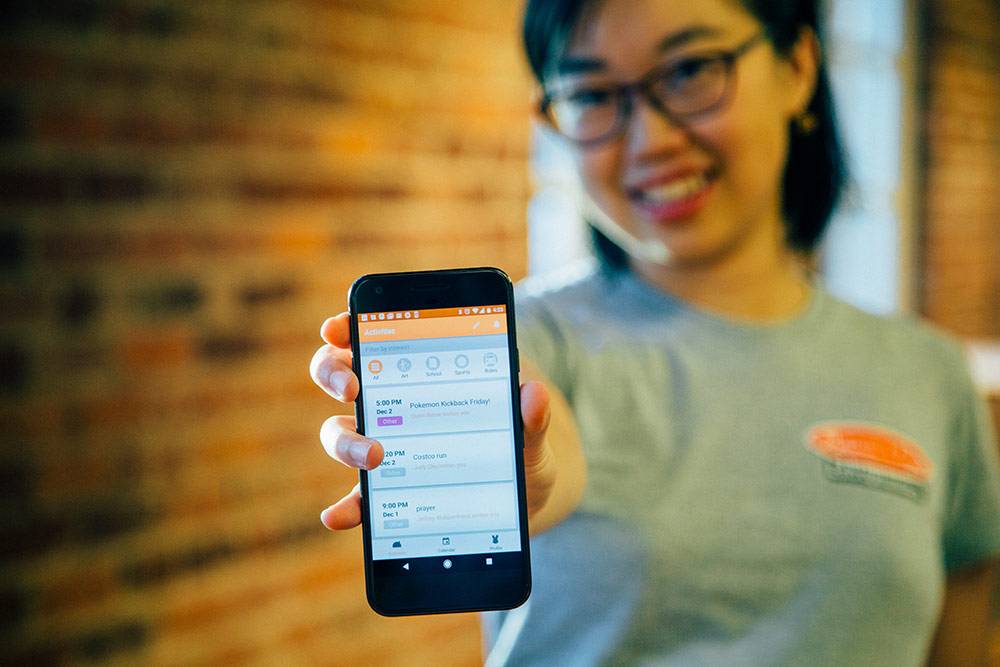Student Entrepreneur's App Is Based on the Business of Friendship
Pratt senior Judy Zhu created Walla that allows students to 'spontaneously hang out'

When senior Judy Zhu first came to Duke two years ago as a sophomore transfer student, she had no idea that she’d build a business. Her new startup, a “spontaneous hangout” app called Walla, stems from those first days when she wasn’t so immersed in the campus social scene.
“One of the most painful memories I had at Duke was being along in my room at Wannamaker and being able to hear all the party noises outside – people blasting music and yelling and laughing and having fun,” said Zhu, a mechanical engineering major. “I just felt this huge sense of indecency, like I didn’t belong here. I didn’t have anyone to go to when everybody else had that group.”
Fast forward three years, and Zhu has not only found her group, but she’s built an app so no one has to feel that way again. With the help of Duke’s I&E Melissa & Doug Entrepreneurs program, she’s growing that idea into a business.
Walla creates community and social opportunity by allowing students to check in to events and invite others. It lets students know about social events such as video game night at a dorm, educational activities like office hours, and allows students to coordinate carpools to the airport over university breaks.
The Walla team has raised enough funding – including a $50,000 prize as winner of the Duke Startup Challenge – that she plans to work on it full time after graduation.
Zhu credits one of her former roommates, Ivonna Dumanyan, with the beginnings of her entrepreneurial journey. Dumanyan, who took part in the Melissa & Doug Entrepreneurs program a year before Zhu, built her business Biometrix to create a wearable device that helps athletes train safely and avoid injury.
Not only did Zhu draw inspiration from Dumanyan’s work ethic, but she attended a three-day conference, the Athgo Global Innovation Forum in Washington D.C., with her.
At the conference, Zhu worked on her first idea, called Genie. It was envisioned as a generosity app where users could perform good deeds for those in the same vicinity – such as loaning out their laptop charger for a few hours – and rack up generosity points.
After she pitched the idea at the conference, an investor approached her to discuss funding.
“That was when the thought of ‘Judy’ and ‘entrepreneur’ came into the same sentence,” she said.
But Zhu didn’t yet have the guidance she needed, and she said she often felt stressed and isolated as she put too much pressure on herself to work on her startup idea.
She found that guidance during her junior year, when she was accepted into the Melissa & Doug Entrepreneurs program. She also became a residential assistant (RA).
Being an RA was great for Walla’s development because it encouraged her “to live the lives of my customers every single day,” she said. “My residents were freshmen looking for a community, and that’s exactly what Walla was supposed to be. So I experienced firsthand what a difference Walla could make.”
 In Melissa & Doug Entrepreneurs, Zhu found that community for herself – a place where she could share vulnerabilities and triumphs and compare notes with others who were facing similar obstacles.
In Melissa & Doug Entrepreneurs, Zhu found that community for herself – a place where she could share vulnerabilities and triumphs and compare notes with others who were facing similar obstacles.
Zhu began to recruit a team of developers and designers to help her build the app. “Genie” morphed into “Walla” as Zhu saw a greater need for social connections on campus. To promote the launch of Walla at the beginning of this academic year, she hosted nightly “coffee chats” via Google Hangout over the summer to answer questions and chat with incoming freshmen.
On Jan. 20, Zhu and her team will release Walla 2.0, celebrating with a release party at 5 p.m. at the Innovation Co-Lab.
The new version of Walla will have upgraded features including improved event invitations.
Through conversations with Duke administrative officials, Zhu has discovered that Walla isn’t only useful for students.
“I realized it wasn’t just a consumer app,” she said. “It was an enterprise solution where we can offer schools these incredible insights into what their students are doing.”
Walla now aims to collect granular data on students’ activities – not only to help universities cater to students more effectively, but also as a tool to use for possible mental health intervention.
For example, Zhu said, if a student goes to an activity regularly and then suddenly drops off the map, it could be a warning sign for depression or stress.
Zhu has her sights set on all the universities in North Carolina. This semester, Walla is also beta testing with about 20 students at each of these schools.
Walla’s goal, Zhu said, is “to have a robust skeleton that can be curated for each school. Each school has a different social atmosphere, so we don’t want to go in with a cookie-cutter model.”
And even though Zhu won’t return to Duke next year, Walla will, with a goal of officially launching at all North Carolina schools in August. Each school will be granted a six-month free trial period before the schools are asked to pay for the service – a rate that varies depending on how many students are using the app. Walla will remain free for individual users.
And even though Zhu once questioned whether she belonged at Duke, she will graduate in May knowing that she did.
“I’m ecstatic with what I’ve been able to accomplish at Duke,” she said. “I’ve scratched every itch and pushed my limits at every opportunity. Now I can see that I belong at Duke in my own way, and I want to help other students find that sweet spot for themselves.”